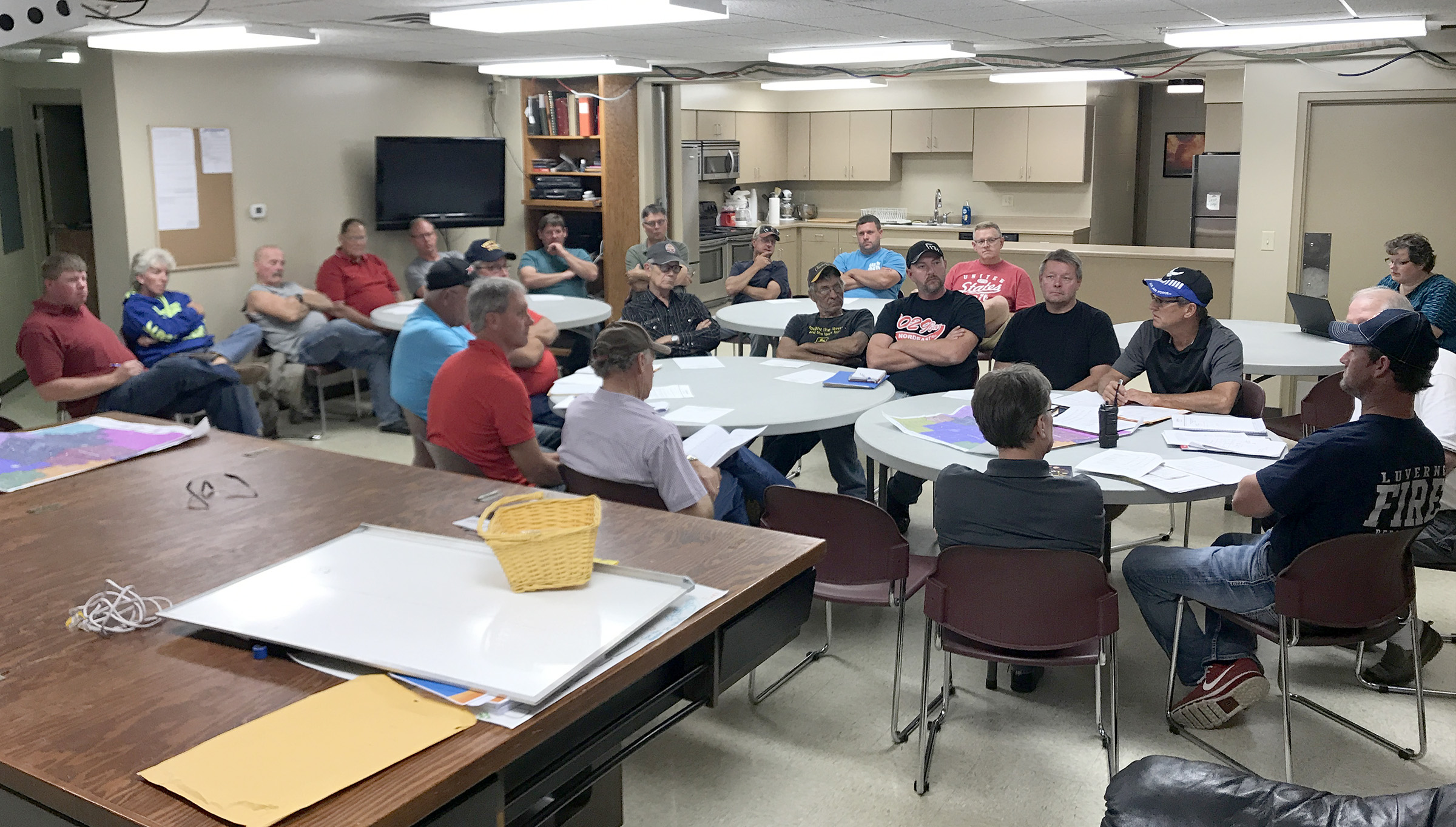
Fire protection isn’t cheap, and rural township officials are questioning the price they pay for emergency response from the Luverne Fire Department.
The groups met Sept. 7 for their annual budget review, and township officials showed up with pointed questions — such as:
•“Why are we still making payments on a pumper truck that’s already paid for?” and
•“Why don’t other fire departments charge townships for trucks? Why does Luverne make us pay for them?”
•After Thursday’s meeting they’re asking, “Why don’t we have any say over purchases that we’re getting charged for?”
The meeting prompted other questions about fire protection and what it’s worth.
•For example, “What if we bought used equipment rather than always brand new?” and
•“What happens if we decide not to contract with Luverne for fire protection?”
These questions are at the heart of discussions among townships boards, which are seeing increasing demands on their budgets.
Mostly they feel helpless to control their fire protection spending. It’s a take-it-or-leave-it proposition, and many are not in a position to leave.
Abandoning the Luverne contract would mean contracting with smaller departments — Hardwick, Jasper, Magnolia, Hills or Beaver Creek. Some could reach out to Adrian, Lismore or Edgerton in neighboring counties.
Many of Rock County’s rural fire departments are reliable and well trained, but they often operate with mutual aid from Luverne for bigger disasters — especially for extra water.
“These guys do a good job,” said Mound Township Clerk Dave DeBoer. “But there’s something about it when Luverne pulls in with their big trucks and all their equipment; they get things done quickly.”
Given the choice, most fire victims would choose the Luverne Fire Department to respond to their emergency.
LFD has 37 volunteer firefighters, all equipped with the latest training and current equipment.
This response has earned an ISO rating of Class 4, which compares with many Rock County’s rural departments at Class or 5 or 6.
ISO ratings, Insurance Service Office, provides information on risk with 1 being the best (1 and 2 are for full-time departments) and 10 is the worst.
Class 9 or 10 ratings are typically rural areas without adequate access (distance) to fire hydrants or fire departments.
LFD’s solid rating comes at a cost and with strings attached (like maintaining a certain level of equipment and training). If Luverne’s standards drop, so does the rating.
By the numbers
Townships pay 25 percent of Luverne’s fire budget — $71,623.44. This breaks down to $641 per section, and that’s set to increase next year.
Some townships have more sections covered by Luverne than others, but the total township contribution helps with all budget items, including capital reserves for purchases related to township fire protection.
This includes an annual payment of $21,723 for a $182,600 rural tanker that was purchased in 2010. It was financed at 5 percent interest over 10 years, but was paid off early.
However, next year’s fire contract with townships still lists the $21,723 payment, and township officials are wondering why those payments haven’t stopped.
“I think they’re pulling a fast one,” said Clinton Township Board member Henry Zwaan.
The short answer is that a new pumper/rescue truck will be needed in 2019 for an estimated $700,000. (The $620,000 truck will be equipped with $80,000 worth of equipment, such as Jaws of Life, airbags for heavy lifting and eight radios at $3,500 each.)
The 25-percent rural share of that truck will be $175,000 over six to seven years.
By continuing the $21,723 payments, cash will be built up in reserves to save money on finance costs when a new one is needed.
Fire Chief Dave Van Batavia said he took exception to the notion of a “fast one” at the meeting.
“We’ve been saying for years that more money will be needed for future purchases,” he said.
“We mentioned keeping the payments going so the money will be there when it’s needed.”
New or used
Some asked why Luverne doesn’t buy used equipment.
Sometimes it does. It bought a ladder truck several years ago at half the price of a new one.
But, buying used sometimes translates to buying unforeseen expenses, according to City Administrator John Call.
“If you buy new, you know what you’re getting. I don’t want to buy someone else’s problems and have to pay to rehab them,” Call said.
“You could defer the purchase, but they’re not going to get cheaper.”
Also, he said new equipment has a longer lifespan — 25 years in the case of the $700,000 pumper truck in the 10-year budget.
“It’s top of the line and you know it’s safe,” Call said.
“Dave [Van Batavia] puts in all kinds of training for these guys, and he feels responsible for their safety.”
He pointed out that NFPA requirements often can’t be met with older, outdated equipment, and fighting rural fires requires specialized equipment that wouldn’t otherwise be used in the city.
“Safety is a factor. We (the City of Luverne) put a high priority on safety of our volunteer firefighters,” Call said.
“Our fire department will follow the NFPA on all of our equipment. “The Luverne firefighters are the ones who have to operate the equipment so I think our department should be in charge of the specifications.”
‘Getting out of the fire truck business’
A big talking point at Thursday’s meeting was whether or not townships should have to pay for equipment at all.
“What I want is to pay for fire protection and get out of the fire truck business,” said Vienna Township Board Chairman Kraig Rust.
The contract with Luverne affects the townships of Luverne, Magnolia, Kanaranzi, Clinton, Mound, Vienna and Springwater
Some townships have more sections contracted for services than others.
For example, Springwater Township has only four of its sections contracted with Luverne, so it pays $2,570.
Luverne Township pays for more than 26 sections for a total of $16,847 while Vienna Township has 15 sections and pays $9,638 per year.
Rust points out that his township has had only one fire in the past five years.
Vienna Township levy is set at $60,000, and it hasn’t been increased in eight years. “We try to live within our means,” Rust said.
He said he’d like to pull out of the contract, but Hardwick and Magnolia fire departments are eight miles away. Kenneth’s own fire department recently dissolved.
Van Batavia said rural townships may not know how much city equipment and water is at their disposal and not billed in a contract.
A grass rig is used only for rural fires and the townships weren’t specifically billed for it, as is a rapid response vehicle that goes to all rural calls.
Also, the Luverne tanker often fills at city hydrants to bring water to rural fires.
“The city doesn’t bat an eye at that,” Van Batavia said.
“We can have as much water as we want to fight a rural fire.”
Saving money on fire trucks could raise premiums
Without fire protection, the fire protection class code for insurance rating purposes changes to a protection Class 9 or 10 — unprotected. This is happening in towns such as Leota, Steen, Ash Creek and Kanaranzi.
This results in residents paying higher homeowner’s premiums, according to Shirley Top, an insurance agent with Kozlowski Insurance.
She said the difference can amount to $200 or more per year on a homeowner’s policy.
“ Insurance premiums are based on protection class ratings. Luverne is a protection Class 4; other area towns are 7 or 8. “Luverne does have a good fire department, and it does make a difference.”
Her husband, Steve Top, is on the Clinton Township Board and took the lead on township questions Thursday night.
He said he understands fire protection costs money, but he wonders about all the equipment — most of it purchased brand new.
“We got this one paid for, and now there’s another one in the budget,” Top said. “Where does it stop?”
Call points out that section fees are remaining the same and have increased slightly in recent years to afford future expenses.
“We do have a top-notch fire department that covers a vast amount of the county,” Call said.
“Unfortunately, that costs a lot of money.”
Some township officials left the meeting shaking their heads, and Call said he knows people aren’t happy.
“I’m glad we had the meeting,” Call said. “At least we’re communicating.”
He said another meeting may be set to further discuss the contract.
Meanwhile, township representatives arranged a meeting Wednesday with fire protection specialists from the state fire marshal’s office in Minneapolis.
“We’re just township guys, and we need a little help,” said Rust, who scheduled the meeting.
DeBoer said he welcomed the opportunity to hear outside perspectives on rural fire contracts. “I think we’ll all learn something,” he said Tuesday.


